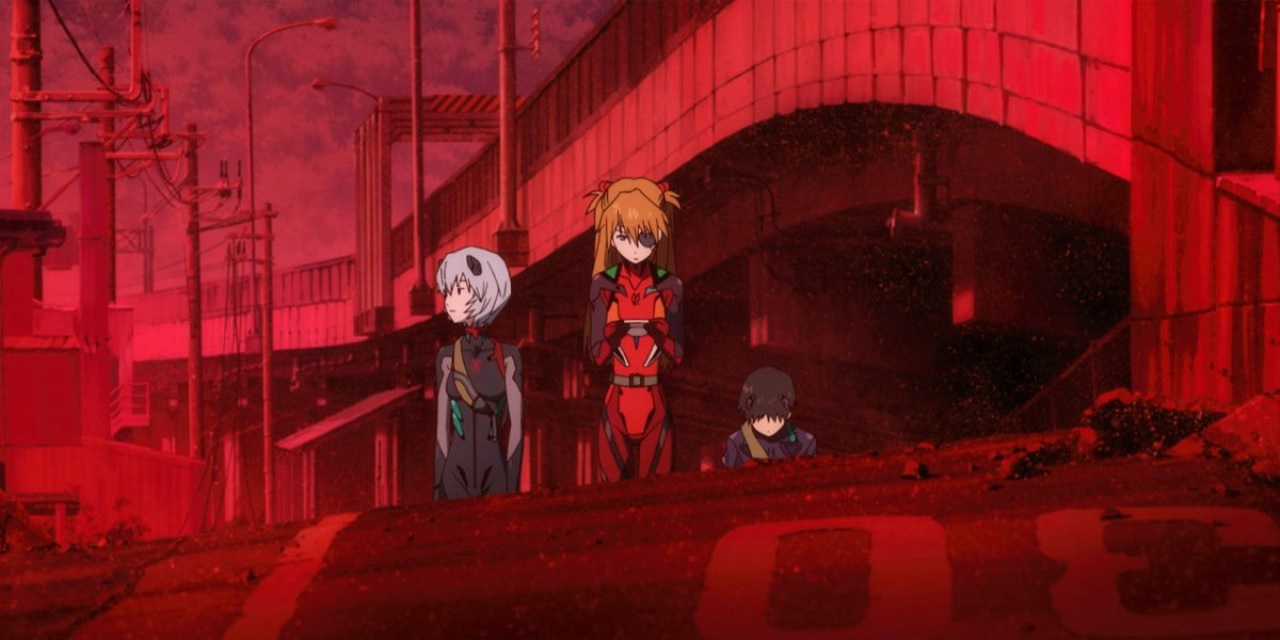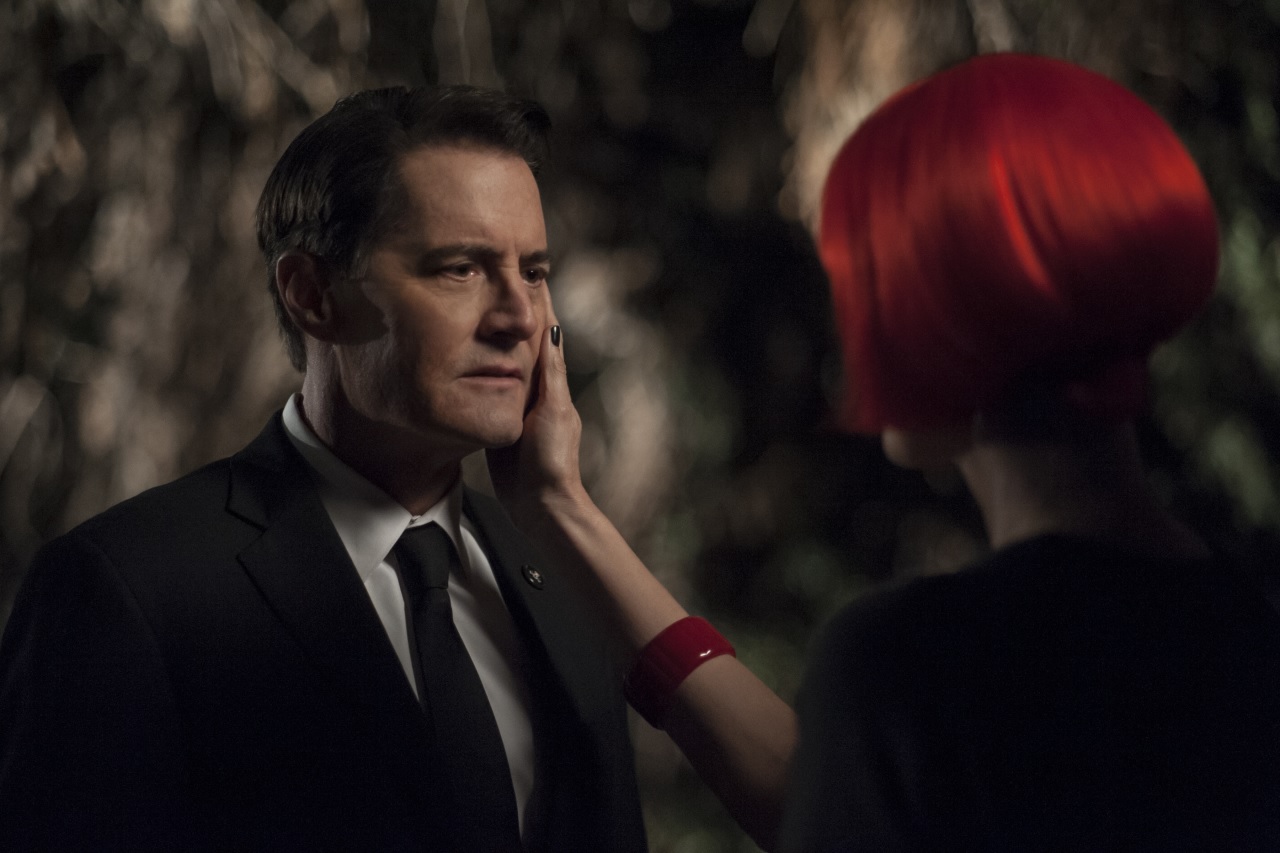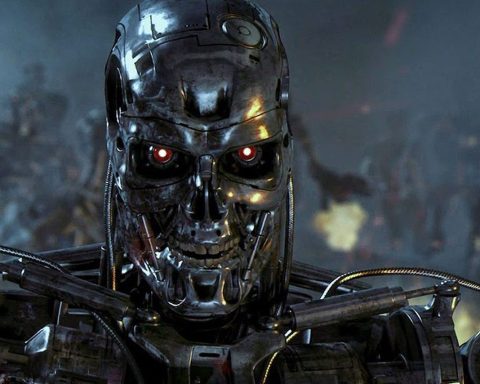Two influential media franchises from the ‘90s, Twin Peaks and Evangelion, both came to an end within the past few years. While these two series may not seem to have many obvious similarities, with one being a live-action murder mystery and the other a mecha anime, there are several parallels between the franchises. Each starts out resembling a standard work within its genre but gradually evolves into something unique, with the narrative shifting away from each genre’s conventions. Both series also feature bizarre, surrealist imagery, giving each a distinctive visual style.
(Note: It should go without saying, but spoilers ahead. You have been warned – ed.)
The endings of both series are also surprisingly similar. Both involve the protagonist undoing the inciting event that launched each franchise’s plot. In Evangelion 3.0+1.0: Thrice Upon a Time, Shinji rebuilds the Evangelion narrative to be free of Angels and EVAs, ending the conflict that drove the entire franchise. In Part 17 of Twin Peaks: The Return, after orchestrating the defeat of the demonic entity BOB, Agent Cooper travels back in time to prevent the murder of Laura Palmer, the event that brought Cooper to the town of Twin Peaks in the first place.
Undoing Laura Palmer’s murder, an event around which the entire series revolves, rewrites the history of Twin Peaks into one in which its raison d’être has vanished. This erasure completely changes the dynamics of the story, as depicted in the final episode of the series, Part 18. This epilogue is what prevents the ending of Twin Peaks from degenerating into a wish fulfilment fantasy for Cooper.
In Part 18, Agent Cooper leaves the Black Lodge and enters the world he created by preventing Laura’s murder. Laura’s survival has scrambled the characters’ identities: Cooper is now named Richard and later meets a woman resembling Laura Palmer going by the name Carrie Page. Laura’s survival somehow disrupted geography as well: Cooper finds himself in Odessa, Texas, far from the Douglas firs of Twin Peaks, Washington. After returning someone who isn’t Laura Palmer to a house that was never Laura Palmer’s house, Cooper appears increasingly confused, with the series’ last line being his question, ‘What year is this?’ Carrie screams, the lights go out, the camera cuts and Twin Peaks is over.
The ending of Twin Peaks, with its unease and dissatisfaction, is different from conventional endings, such as that of Evangelion 3.0+1.0, in which things are neatly wrapped up. The ending of 3.0+1.0 is presented as an extended therapy session, with Shinji finally making amends with his father and getting closure from Kaworu and Asuka. Finally, on an empty sound stage, he explains his idea of ‘Neon Genesis’ to Rei: ‘I won’t rewind time or revert the world. I’m just going to rewrite the world into one that doesn’t have Evas.’
In the end, Shinji does just that, with the Evangelion units annihilating themselves one by one. Now an adult wearing a suit and tie, Shinji appears on a train platform with Mari and the two of them run up the stairs, with the film’s final shot merging the animated world with live-action footage of the director’s hometown. Is the world that Shinji created our own world, one that never experienced the trauma of Evangelion except through fiction? Shinji — and perhaps the Evangelion fanbase — has grown out of the need for fictional realities, and thus the series comes to an end.
The ending of Twin Peaks can also be interpreted as intersecting fictional realities with the real world. One common reading of Part 18 is that most of the episode takes place in our world rather than in the fictional world of Twin Peaks. The scenes that take place in Odessa are presented in a more naturalistic manner than the rest of the show to that point. There are no supernatural or surrealist elements, just Cooper/Richard trying to find Carrie and bring her home. The owner of what used to be the Palmer House is even played by the house’s real-life owner, Mary Reber. The world of Twin Peaks has been disenchanted, and this loss of the show’s magic and charm may be the most horrific outcome possible. By ‘saving’ Laura Palmer, Cooper changed everything, but even the erasure and replacement of place and identity couldn’t heal the deepest traumas in Twin Peaks. The town’s wounds go far deeper than the life or death of one person. The resolution of one trauma sparked a hundred new ones that may be even worse.
The message of Part 18 could be that, despite fantasies of doing so, some wounds can’t be healed, only transformed. In Lacanian thought, human subjectivity is inherently traumatic. The subject is split by entry into language and the Symbolic order. The unconscious is organised around the trauma of language in a similar manner as the narrative of Twin Peaks is structured around the murder of Laura Palmer, or Evangelion around the conflict between Angels and EVAs. Our sense of self-awareness and ability to think and articulate is the result of this trauma. What would be left if this primordial trauma were to be undone? According to Lacan, it would be the immediate collapse of all psychic structures. Psychoanalysis doesn’t seek to undo the trauma of language but, rather, work around it and with it, using language as a tool to better understand the psyche.
Evangelion’s ending feels conservative and safe because, in tidying up Shinji’s struggles and relegating the series’ formative trauma to the realm of fiction, it returns everything to the status quo — a stasis in which no further narrative movement is possible. Shinji’s desires are fulfilled, the inciting incident that drove the narrative is erased, and he gets to rush out into a new, happy life in a transformed world. The end.
In the cinema of David Lynch, the worst possible thing that can happen to a character is to get what they want. Twin Peaks may be Lynch’s most extreme example of this. Cooper’s desires are fulfilled — saving Laura Palmer — but the attainment of this desire destroys not just Cooper himself, but the narrative and the world. The series ends in a state of confusion, and the lack of satisfaction and closure is grating. It is an anti-ending that continually gnaws at the viewer’s mind. The story of Twin Peaks continues in the endless speculation and theorisation of its fanbase. If Evangelion ends in stasis, then Twin Peaks ends in a fugue state, its characters forever wandering aimlessly through the minds of the audience.














